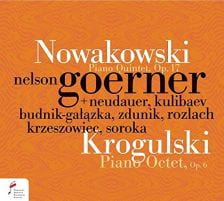Goerner plays Nowakowski & Krogulski
Józef Krogulski – Piano Octet in D minor, Op. 6; Józef Nowakowski – Piano Quintet in E-flat major, Op. 17
Nelson Goerner (pf), Lena Neudauer (vn), Katarzyna Budnik-Gałązka (va), Marcin Zdunik (vc), Sławomir Rozlach (db), Jan Krzeszowiec (fl), Radosław Soroka (cl), Erzhan Kulibaev (vn)
NIFCCD 105 (also available on Amazon.com)
Presented on a new recording produced by the National Fryderyk Chopin Institute in Warsaw, Józef Nowakowski’s Piano Quintet and Józef Krogulski’s Piano Octet are two pieces, today little-known, by composers contemporary to Chopin. Written at the beginning of the 1830s, they are a testimony to the rich cultural life of Poland, which at that time was absent from maps of Europe. This extraordinary recording is an evocation of an œuvre important in the history of Polish music. Interpreted by superb artists enjoying widespread recognition, this CD can be considered a pearl of Polish phonographic art. The recording features Nelson Goerner, an artist devoted to popularizing Polish music around the world who has yet again been honored with the prestigious Diapason d’Or award, this time for his previous album released by the Fryderyk Chopin Institute: “Concerti by Ignacy Jan Paderewski and Giuseppe Martucci.” (NIFCCD 044).
This fascinating new recording was very favorably reviewed by Jeremy Nicholas in the December issue of Gramophone Magazine:
Józef Nowakowski (1800 65) and Józef Krogulski (1815 42). Even in their native Poland their names are hardly known. On this evidence they should have international recognition, for both works are well able to stand comparison with the chamber music of the ‘Great Composers’ of the period.
Nowakowski’s E flat major Quintet of 1833, considered lost for decades, has the same instrumentation as Hummel’s Op 87 Quintet (in the same key) and Schubert’s Trout Quintet. If you like these two masterpieces, I guarantee you will fall for this one. The first of its four movements (15 minutes with exposition repeat) has a second subject which the booklet identifies with some justification as ‘one of the most beautiful in the whole of the 19th-century Polish chamber literature’…. If [Nelson Goerner] is the de facto star of proceedings, rightly setting the pace and tone, his partners match him every step of the way, and in the thrilling note-spinning finale do so with palpable glee.
[…]
This superbly recorded disc is the most enjoyable chamber music disc – and the most interesting discovery – to come my way for some time.
[Sources: December issue press release from gramophone.co.uk, chopin.nifc.pl]
